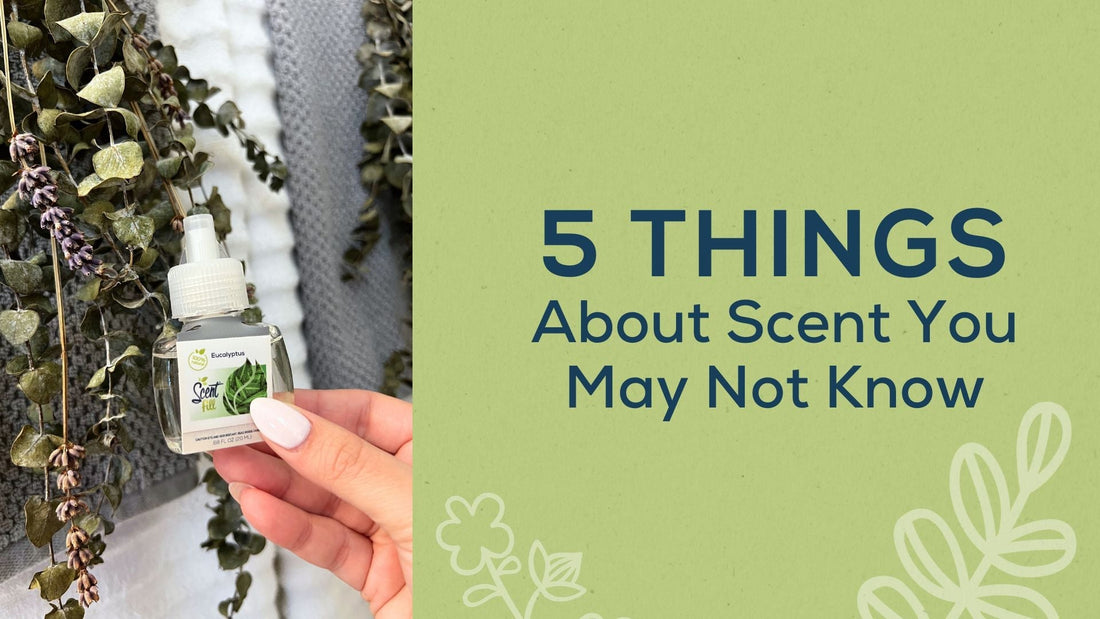Elevate Your Environment with 100% Natural Plug-In Air Fresheners
At Scent Fill, we pride ourselves on being the first and only company to offer 100% natural plug-in air fresheners. Integrity of product is our mantra, and we recognize the profound impact that scent has on our well-being. We invite you to experience our products and enhance your environment naturally.
The Power of Scent
Influence on Mood and Emotion: Our sense of smell plays a crucial role in regulating our mood, emotions, nutrition, and social interactions. The benefits and information we derive from scents are more significant than we often realize.
Health Implications: The loss of smell, highlighted as a symptom of COVID-19, has spurred considerable research. Beyond affecting the quality of life, the sense of smell has profound health implications that we are only beginning to understand.
Complexity and Connectivity: The human sense of smell is remarkably complex, allowing us to identify a vast array of scents and their combinations. Smells connect us to our environment, influence our taste and social interactions, and can even impact our performance.
Nature's Essence in Every Drop
The smells of nature are paramount to our well-being, and that’s where Scent Fill excels. Our products don’t just mimic nature—they come directly from nature. Enhance your environment with Scent Fill plug-ins and experience the true essence of nature in your home.
A Bit About Scent Fill for Context
Scent Fill is the first and perhaps only air freshener company with products that have your well-being in mind. We offer air freshener products that are 100% natural and plant derived. Not one of our plug-in air fresheners has a harsh chemical or something detrimental to your indoor environment. All are certified to be cruelty-free. We hope to earn your trust and will honor and protect it.
Integrity of product is our mantra. We make these claims with well-placed, and science-backed confidence. Our industry position gives us standing to discuss olfactory health, the impact aroma has on wellness and its connection to emotional and physical health. We invite you to learn more about us and our products here.
Scent’s Connection to Well-being
The question of whether smells can affect our health is being answered by science in the affirmative. All of us derive more benefit though our sense of smell than what our intuition suggests. Scientific research is catching up fast and confirming the olfactory connection to wellness. Enhancing and maximizing olfactory benefits should be viewed as a vital element of well-being that changes with our stages of life.
Aroma is tied to enjoyment, sociality, mood, emotional state, and memory to name a few areas of impact. These connections have been documented by scientific research. In an article published by Phycology Today titled Smell Ring Bells: How Smell Triggers Memories and Emotions teaches us that “incoming smells are first processed by the olfactory bulb, which starts inside the nose and runs along the bottom of the brain. The olfactory bulb has direct connections to two brain areas that are strongly implicated in emotion and memory: the amygdala and hippocampus.”
The link between the olfactory bulb and diverse parts of the brain involved with mood, emotional regulation and memory are becoming clear and create a powerful tool for you. And that’s our business: Helping you to maximize the benefits of aroma.
The Vitality of Olfactory Health
If the COVID pandemic taught us anything, it’s the importance the sense of smell has to our overall well-being. It is vital. It ranks with sight and hearing in terms of an impact on the quality of life. However, hearing and vision screenings begin early and continue throughout our lives. Our sense of smell has largely been left to our intuition.
The increase of olfactory loss as a common COVID symptom has given science a reason to study more closely the olfactory role in health and well-being. According to an article published by the National Library of Medicine: The role of smell is “beyond food enjoyment as part of quality of life, [and] smell has the ability to transfer and regulate emotional conditions, and thus impacts social relationships, at various stages across life (e.g., prenatal and postnatal, during puberty, for partner selection and in sickness).” The study makes a clear case for the vitality of smell and its impact on work, social performance, and particularly relationships.
According to the same report, we have the capacity to extract vital information from smell. People with olfactory loss report “issues in their ability to protect themselves from environmental hazards, in their food enjoyment and eating behavior, and in their social relationships, all scenarios linked to the main functions of the sense of smell.” Olfactory health is little understood, but its outsized impact is undeniable and only now receiving the research attention it deserves.
To be clear, we are not saying that Scent Fill products can overcome olfactory loss. We outline power of smell and the impact from its loss to encourage a discussion of how we might maximize the benefits from olfactory health and to emphasize its possible connection to wellness. Opportunities abound to apply aroma’s power to you and your environment.
Consider a few scents that might help regulate mood:


Olfactory Complexity
We don’t know what the nose knows. Olfactory sense has far greater reach than we may think. However, its reach and the internal connections that scent makes are largely unstudied. Most of us apparently would prefer to give up the sense of smell than access to a technologic device. In an un-cited study (interesting, but not credible source, we know) shared by brainfacts.org says that in “a survey of 7,000 young people around the world, about half of those between the age of 16 and 30 said that they would rather lose their sense of smell than give up access to technology like laptops or cell phones.” Short sited for sure and terribly naïve.
Olfaction warns us of danger, cements memories, gives us nutritional hints, affects our mood and emotional state, alters our visual perceptions, underlies most of what we taste, and triggers a host of other internal reactions. And this is a tip-of-iceberg list at best. For a general discussion of the vitality of our noses, see this article from the National Institute of Health.
Have your ever wondered why certain smells make you feel angry or anxious? And how others induce calmness and enhance mood and emotional state? According to the Newsletter published by the NIH: “It’s estimated that the number of odors that people can detect is somewhere between 10,000 and 100 billion, or even more…” The combination of smells within our grasp is unfathomably large. Our detection and processing of those smells is epigenetic. It is in our very DNA. We avoid certain smells because they signal danger to us. In a similar way, we are attracted to others because they signal wellness.
According to the Journal of Socio-affective Neuroscience and Psychology: “Olfactory cues directly link the environment to gene expression. Two types of olfactory cues, food odors and social odors, alter genetically predisposed hormone-mediated activity in the mammalian brain.” A translation of this fussy science-speak might say that it is our sense of smell that links environment to our milieu, especially food and social order. Scent matters right down to what we eat and who we associate with.
Our scents promote an attachment to our environment:


Natural Scents
Olfactory signals can become overwhelming and lead to fatigue. With so many scent combinations and expressions, we often simply default to intuition and feelings about our environment because the buzz of assaulting smells is so profound ( be glad you’re not a dog!) Olfactory fatigue also happens when our environment is dominated by a specific scent for too long. We stop appreciating it. We stop noticing it. Our brains stop registering it.
Fortunately, resetting the sense of smell is a natural and straightforward process. And it is vital that we do so to taste clearly, heed warnings, engage socially, and appreciate the nuance and delicacy of olfaction. Key to olfactory health is found in the smells of nature.
The power of the smells of nature are well-documented. An article in science.org titled Nature and Human Well-being: The Olfactory Pathway makes the case that the smells of nature are paramount to human well-being. It says: “Bringing together expertise across the health, natural, and social sciences, we offer the statements and the conceptual framework that follows as a foundation upon which future research can expand—as a more complete understanding is built regarding the relationship between nature, olfaction, and human well-being.” Science is finally understanding why scent is profound to our well-being.







